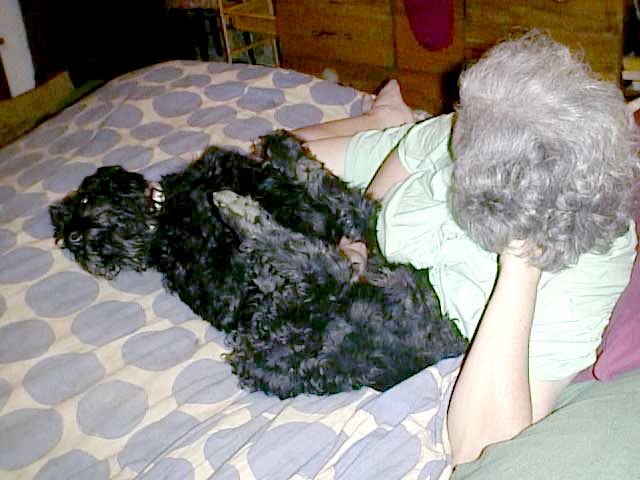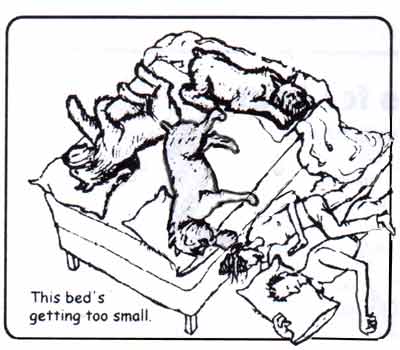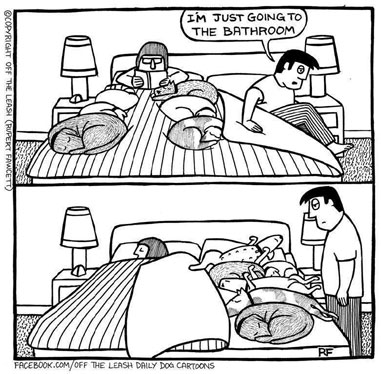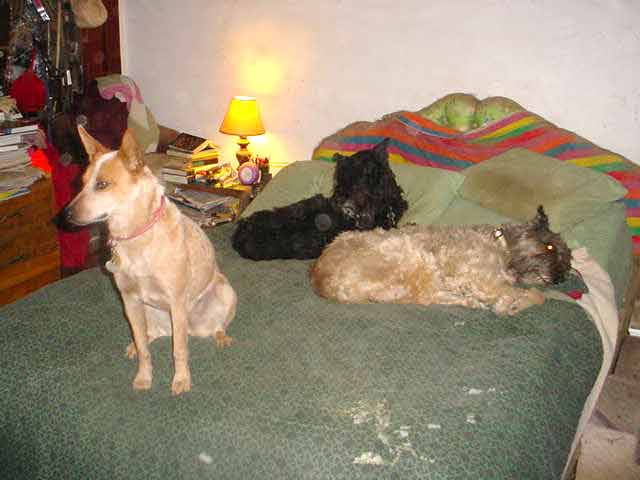 an evening cuddle with my adored Pixel (her partner in crime , my precious Chris , not in photo) |
Dogs in Bedsharing your bed with your dog |
The topic of dogs sleeping with their humans goes back to at least 124 AD when Arrian wrote in favor of it in his book Cynegeticus. Since then many dog advice books have written against letting your dog share your bed. But I tend to agree with Arrian. So I am writing largely in favor of sleeping with your dog if you want to do so. I doubt that in itself this practice causes behavior problems that would not occur otherwise. I also discuss advantages and disadvantages and advised training for the dog. I include the exceptions, dogs who should remain on the bedroom floor or crated, at least for the time being.
 an evening cuddle with my adored Pixel (her partner in crime , my precious Chris , not in photo) |
| SITE INDEX | BOUVIER | RESCUE | DOG CARE |
| PUPPY REARING | TRAINING | PROBLEMS | WORKING DOGS |
| BOOKS | VERSE | IMAGES | MISCELLANEOUS |
The topic of allowing your dog to sleep with you in your human bed has long been controversial. Like the issue or playing tug-of-war with your dog, sharing your bed has been often said to be a cause of problem behavior, of causing the dog "to think he is your equal" and thus becoming insubordinate. Now there's been little research on these topics, just a lot of opinion. The research on tug-of-war tended to support a conclusion opposite to the dire warnings. I know of no research so far that has compared percentage of well behaved dogs who sleep with their people to percentage of badly behaved dogs who do so. Nor any research in which dogs who previously slept on the floor were admitted to the human bed and results on dog's behavior objectively measured. (There is fair evidence that badly behaved dogs who are exiled from the bed as part of a "Nothing in Life is Free" type of program will improve in behavior and attitude, but it's not clear how big a role the loss of bed privileges plays compared to the rest of the program.)
The comment about getting up withOUT fleas reflects that today we have so many good ways of preventing fleas on our dogs. So we can share their body warmth without having to share their fleas. Needless to say, we also should exercise tick control for the dog and prevent or treat any other zoonotic contact transmissable health problems. But all these issues would apply to the dog on the floor as well as the dog in our bed. .
The earliest preserved writing that mentions dogs sleeping with people was that of Arrian (Flavius Arrianus, a Romanized Greek , born circa 96 AD and died circa 180 AD) in his book Cynegeticus , written circa 124 AD. Arrian wrote aproximately 550 years after Xenophon, author of the earliest preserved book on hunting dogs, also titled Cynegeticus, and the earliest preserved book on horsemanship."De re equestri". (as well as his "Anabasis" and his "Life of Cyrus" , both dealing with Persia) Arrian admired Xenophon greatly and styled himself "Xenophon the Younger". Arrian is best known for his biography of Alexander the Great, which drew on sources written by Alex's contemporaries and companions, sources now lost to us.
Arrian's Cynegeticus particularly promoted the new type of hunting , coursing with Celtic gazehounds. This was hunting for sport, the delight of watching the hounds work, more than to put food on the table. Arrian shows a level of personal affection for dogs that is absent from the work of Xenophon. Of his own favorite dog he says :
She is very gentle and very fond of people; never before did any other hound yearn as she did for either me or my companion and fellow hunter, Megillus. For when she quit her course she still did not leave either of us. But if I were at home, she would pass her time with me and escort me when I went out somewhere.
As to where the dog should sleep, Arrian says :
There is nothing like a good warm bed. The best is that with a human being, because hounds are made fond of people this way, and they rejoice in human skin and love the person they sleep with no less than the one who feeds them.
He adds that the person sleeping with the dog would notice if the dog were unhappy or thirsty or needed to urinate or defecate or if the dog threw up. Thus this person would know if the dog were well rested and fit to go hunting the next day.
Arrian, like Xenophon, clearly understood both classical conditioning and operant conditioning, though he does not put names or lables on these concepts or even identify them as concepts. He just talks about what works well to have a hound hunt well. He, like Xenophon, clearly makes use of the dog's genetically hard-wired joy in the job of hunting prey as the chief reward for doing such hunting. (This is what Dr Dunbar calls "life rewards" and what I call "internal rewards" or "it feels good to his genes" rewards.) The huntsman is also to cheer the dog on and praise the dog as an additonal encouragement and reward. He recognizes that some dogs are going to be good hunters and some never will be good reliable ones and that a lot of that is in the individual's nature.
All of this is about two millenia before Pavlov, Skinner, and Mendel and Darwin. But Arrian and Xenophon worked with their animals and were good observers. Like anyone else concerned with animal raising, they knew about the effects of selective breeding.
Xenophon makes no mention of where the dog should sleep or of dog-housing in general. Varro, writing in 36 BC, seems to be the earliest preserved mention of kennels as a familiar concept.
Many books advise against allowing your dog to sleep with you. Mostly the warning is that allowing the dog that priviledge will "make the dog think he is your equal". When I read that aloud to my soul-mate Chelsea, she gave a scornful reply "I would never sink so low !" and followed that with "the bitch who seeks to be equal to a mere human lacks ambition."
Now Chelsea shared my bed every night of our decade of life together and for the second half of that Bones shared it too (and continued to do so after Chelsea's death for the many years until his own death). Chelsea and Bones were both superbly accomplished and responsive as herding dogs, tracking dogs, protection dogs, and formal obedience dogs. They worked for me diligently and honestly and I cannot believe they would have done so any better if they had been relegated to sleeping on the floor. Now Chelsea was rather condescending to most humans and there's no doubt that she knew very well that her abilities were superior to mine in regards to all scentwork and in regards to instant "reading" of and control of livestock (sheep and cattle). Bones must have also known his superiority in those regards, but he was quite charming to just about all humans.I've since shared my bed with many dogs who remained well behaved and well bonded to me. Therefore, based on much experience, I tend to agree with Arrian that co-sleeping may well increase trust and affection without diminishing respect and obedience. Sleeping together won't create respect in the dog , but it won't diminish it either. It won't create obedience , but it won't diminish it either. You need respect and obedience but you need trust and affection just as much.
So where does the idea that letting your dog share your bed causes behavior problems come from ? It's likely that if one goes to any problem dog training class or behavior problem clinic and asks "does your dog share your bed ?" the majority might say "yes". But that is meaningless unless it is compared to the responses from owners of dogs whose behavior is considered unobjectionable : it may well be that an even higher perccentage of well behaved dogs have bed sharing privileges ! I don't think anyone has done this research.
Also of course some people express great dissatisfaction with their dog's behavior over very mild issues, issues that other people wouldn't notice or would accept as being normal dog behavior or would apply management or training procedures to change those behaviors and easily succeed in doing so. While other people may express satisfaction with their dog's behavior despite that behavior including some issues that you or I or any senible person would find highly objectionable or even quite dangerous. So comparing "problem" dogs to "non-problem" dogs can be misleading, since a "problem" is so often in the eyes of the beholder. Lumping all kinds of problems together could also be mis-leading. Perhaps the very factor that increases problem A also decreases problem B. It's very hard to come up with an objective measure of the gradations between a wonderfully well behaved dog and an abominably behaved one.
One could, I suppose , go to a lot of performance events and ask everyone where their competition dog sleeps and then correlate that with the quality of the dog's performance as measured by the score that day. But I suspect that most Obediance Trial dogs are sleeping in the owner's bedroom and probably sharing the bed. Most USBCHA sheepdog trial Border Collies aren't even living in the house. So there may not be enough variation in dog husbandry to prove a corelation with trail performance. Anyway prize winning trial performance may not say much about the dog's behavior as an ordinary house-dog and companion dog. And it's to those with family companion dogs that the advice against co-sleeping is addressed.
Of course the problem people are usually most concerned with is the dog being threatening ("aggressive") towards people and, especially, biting people. Here there is a potential for doing useful research. One does have to objectively classify the severity of all bites, as they range from the "air snap" that intentionally does not make contact, to soft contact with no damage, to contact with minor injury not requiring medical attention (home first aid only), to tearing that does require a medical visit, to mauling and maiming and , finally , lethal attack. Dr Dunbar has published a scoring system for bite severity.
(Lethal attacks are extremely rare, less than 20 per year in the entire USA during the past couple of decades (according to records from CDC), and I would bet just about anything that none of these dogs shared a human's bed. Indeed some later analysis of records shows that most of these dogs don't live in the house at all, are not considered to be members of the family but simply as animals living on the property. Most of these dogs were also essentially untrained. )
So there could be a retrospective study that correlated bite severity with whether or not the dog has never slept with a human or co-sleeps infrequently or frequently. I think rather than simple correlation, a multifactorial design that included the amount of training (at least none vs basic vs advanced) and the owner's leadership qualities (very hard to objectively measure !) would be better, with ANOVA statistics to separate out the effects of these factors. Or a prospective design with matched littermates randomly assigned to raisers who would either share bed or not share bed. This latter would be hard to do, as it's hard to find dog raisers who would stick to the plan of never allowing the dog to sleep with them.
Those humans who want to invite a dog into bed may very well be different from those who would never consider doing so or are repelled by the very idea. There might also be some dogs who would never consider wanting to join a human in bed. There certainly are dogs who will make a brief visit onto the bed and then spend most of the night on the floor. There certainly are some who are especially known to be obligate under the covers dogs (Basenjiis and Doxies are well known for this). So the range of the dog's own desires makes still another factor to be considered in experimental design .
Remember also that bed sharing doesn't just have potential effects on the dog's behavior, but also surely has effects on the person's attitude towards the dog and the person's behavior towards the dog. There is always what we might call "Heisenberg's Principle of Dog-Human Interactions" : the human affects the dog and the dog affects the human ; one cannot measure one as being independant of the other.
My conclusion is that presently we really don't have good evidence of any bad effects of co-sleeping. My opinion is that we may never get really good evidence, ie good in the sense of being really good solid science.
The one area where co-sleeping would be highly likely to make a problem worse is where the dog is already showing some posessiveness / jealousy of one of the humans against another or is behaving territorally about the bed itself. Typically this is the dog being posessive of one spouse/partner against the other. If a dog glares or grumbles when a human who normally would occupy that bed approaches the bed, then that dog should instantly be permanently exiled from all bed privileges. Let the jealous/posessive dog sleep crated. The same goes for dogs who guard their place on a sofa or place next to their person on the sofa. This is not a well behaved dog being turned into a problem , but rather a problem dog exhibiting a pre-existing bad attitude in the bed or sofa situation. Preventing the dog from being on the bed at least prevents the dog from threatening those who approach the bed. The dog is not gaining further practice in scaring people away. Ideally this exile should be part of a larger program of "Nothing in Life is Free" , "Learn to Earn" , and similar concepts whereby the human gains leadership and control in a non-confrontational way.
Well you have probably already noticed that my own dogs are very welcome to sleep with me. My view is basically that if you do some basic training and if you are a good pack-leader to your dogs, if you set rules and limits for them and are consistent about these with approval and disapproval as needed, then your well behaved dog will be none the less well behaved if you invite her to share your bed. She might even be better behaved.
The corollary to that statement is that dogs who are NOT well behaved , or not yet well behaved, should NOT be sharing your bed. This may mean that you have to upgrade your leadership skills and status and do some dog training before you grant that dog bed privilges. For some, the invitation may never be earned, but for others it will be earned and granted eventually.
The dogs who probably should NOT be sharing your bed , or not yet, would be puppies, foster dogs, newly acquired dogs, and dogs who are not generally accepting human leadership.
With a puppy, if the puppy is in bed with your, you will be aware if the puppy becomes restless and needs to go outdoors for a potty break, thus facilitating housebreaking.. Well, maybe I should say this is true if you are not a real heavy sleeper. The pup's size and fragility might also be a factor in regards to worries that you might injure the pup by rolling over or being restless sleeper in general. Also worries if puppy might jump down off the bed on slender fragile legs and be injured. So the alternative is a crate on the floor next to your bed. That's absolutely OK too. Crating also prevents pup from getting off the bed (while you sleep too soundly to be aware) and finding some dangerous or valued item to chew and demolish.
With my foster dogs, I generally don't invite them up on the bed or onto any furniture at all , because I want to leave that decision for the adopter to make. The adopter may not want the dog on the bed and it can be hard or harder to establish floor only with a dog who has previous bed and furniture experience. The exceptions are dogs who are really quite timid, because for those dogs coming up on the bed with me is very helpful in gaining the dog's trust. Arrian would probably say "I told you so" about this aspect.
I'd also suggest to a new adopter to wait until the newly adopted dog is reasonably well trained and well behaved and there is no longer any question of who is the leader here before you begin to invite the dog to bed. (And the same advice to wait would be applicable to a newly acquired human romantic interest !)
As long as a dog's behavior seems problematic to you, especially if that dog does not respect you (or your human partner) as leader, I would advise that you not invite the dog to bed. (And the same would be applicable to any human you might contemplate a relationship with !)


Cues or commands the bed-sharing dog should know and obey :
Photo of my current three dogs on my bed ; I am not in bed because I'm taking the photo. Velvet is the black Bouv at the rear ; she likes to be on the bed after I have gotten up, and the spot she is in is the spot she likes best, ie the spot I vacated. Grover is the fawn Bouv ; he comes up via the doggie steps and only stays a while, as he'd rather sleep on the floor. Fox the Wicked Queensland is nearest camera, thus looks much larger than she really is. Fox is a great bed dog : she snuggles well and she moves over easily when asked to do so.

There are now many pieces of science evidence as to why bodily contact between human and dog feels so good, feels so calming, and is beneficial to both. These would apply equally well to co-sleeping.
None of these findings would really surprise anyone who enjoys living with dogs. These just give some of the biological mechanisms behind the effects we've all experienced.
| site author Pam Green | copyright 2003 |
| created 7/7/2012 | revised 7/10/2012, 7/27/2017 , 10/18/2020
|
| return to top of page | return to Site Index |